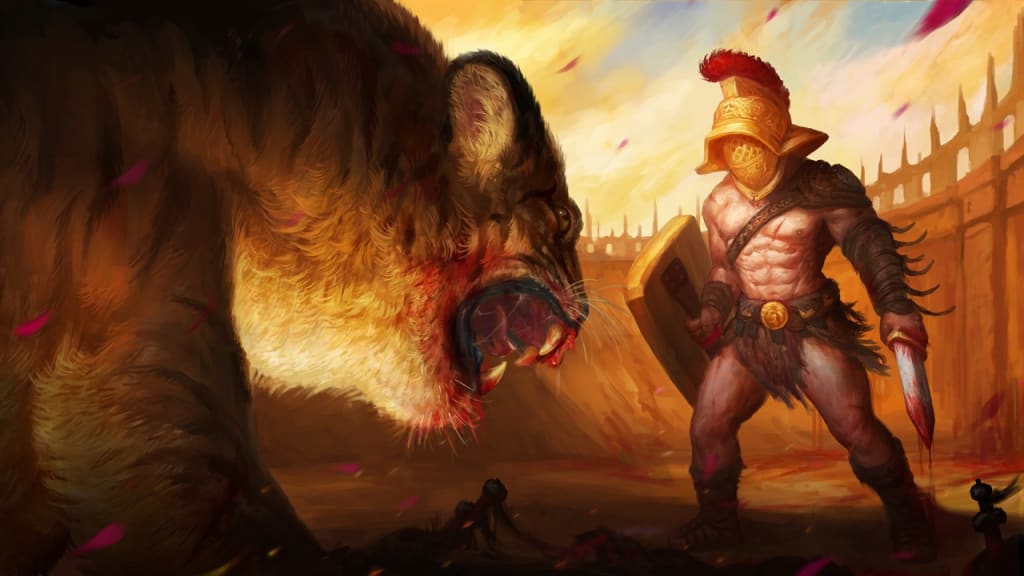Gladiator's Triumph
A Tale of Vengeance, Redemption, and the Triumph of the Human Spirit

In the vast colosseum, where blood and honor clashed, a gladiator named Maximus stood tall. His chiseled physique and steely gaze concealed a heart burdened by tragedy and a thirst for justice. Maximus, once a celebrated general, had been betrayed by the very empire he had sworn to protect. Now, he fought not for glory, but for vengeance.
Maximus was born to a noble family in the province of Hispania, a land teeming with beauty and rich history. As a child, he was captivated by tales of valor and heroism, which sparked a fire within him. He trained rigorously in the art of warfare, honing his skills with unwavering dedication.
His reputation as a fearless warrior spread far and wide, catching the attention of Emperor Marcus Aurelius himself. The emperor, weary of the corruption that plagued Rome, saw in Maximus a glimmer of hope. He envisioned a Rome that stood for justice and honor, and he knew that Maximus was the man to lead such a transformation.
But fate had a cruel twist in store. Commodus, the emperor's treacherous son, grew envious of Maximus' glory and the affection Marcus Aurelius held for him. Consumed by jealousy and driven by a lust for power, Commodus hatched a plot to eliminate his rival.
On the eve of his victory, as Maximus basked in the glory of triumph, Commodus struck. Under the cover of darkness, assassins descended upon Maximus' camp, leaving a trail of death and destruction in their wake. When the dust settled, Maximus emerged, battered and bruised, to find his family slain and his dreams shattered.
Grief and rage burned in Maximus' soul like a wildfire. He vowed to avenge his family and bring justice to those who had wronged him. Captured by slave traders and sold into the merciless world of gladiatorial combat, Maximus embraced his new identity. He became a gladiator—a symbol of defiance and unwavering strength.
In the colosseum, Maximus faced a constant battle for survival. His opponents, fueled by desperation or driven by bloodlust, fought with ferocity. But Maximus, with every swing of his blade, sought not only to survive but to keep the flame of hope alive. He became a hero to the oppressed, a symbol of resistance against a tyrannical empire.
Word of Maximus' exploits reached the ears of Commodus, now Emperor of Rome. Consumed by fear and obsessed with eliminating the thorn in his side, Commodus devised a sinister plan. He would face Maximus in the arena, hoping to extinguish the rebellion that burned within him.
The day of reckoning arrived. The colosseum teemed with eager spectators, their breaths held in anticipation of a brutal showdown. Maximus, scarred and weary, stood tall, his eyes fixed upon Commodus. The air crackled with tension as the two adversaries locked eyes, both driven by vengeance and a desire for justice.
The battle that ensued was a dance of blades and raw emotion. Maximus fought with the strength of a thousand men, fueled by the memories of his fallen family. Commodus, driven by fear and the weight of his own guilt, fought desperately to cling to power.
As the sun dipped below the horizon, casting a golden glow upon the colosseum, Maximus finally delivered the blow that would bring justice to his family. Commodus fell, defeated but not before tasting the bitter triumph of his own demise.
Maximus, wounded and weary, stood over the fallen emperor. The crowd, stunned into silence, slowly rose to their feet, their applause echoing through the ancient walls. In that momentIn that moment, Maximus's victory was not just a triumph over a single man; it was a triumph of the human spirit, of resilience, and of the unyielding pursuit of justice. The colosseum erupted in thunderous applause, mingled with tears and cries of jubilation.
As the crowd celebrated, Maximus's gaze turned inward. He felt a bittersweet sense of accomplishment, for he had avenged his family and brought down a corrupt ruler. Yet, his heart still ached for the life he had lost and the void that could never be filled. The weight of his experiences settled upon him, and he knew that his journey was far from over.
Maximus's triumph in the colosseum had sparked a flicker of hope in the hearts of the Roman citizens. They yearned for change, for a Rome that embodied the virtues of justice and honor. Maximus, now a symbol of resistance, vowed to continue the fight, not just for his own sake but for the countless others who suffered under the oppressive rule of the empire.
With newfound allies and a burgeoning rebellion, Maximus rallied the people to rise against the tyrannical regime. He led them through treacherous battles, the blood of their fallen comrades fueling their determination. The empire trembled under the weight of their defiance, and whispers of liberation spread like wildfire.
But fate, ever capricious, had other plans. In the midst of their final assault on the imperial palace, Maximus found himself face to face with a formidable adversary—a loyal soldier of the empire, a friend from his past. The clash was brutal, their swords weaving a tapestry of conflict and sorrow.
With each strike, Maximus felt the weight of his choices and sacrifices. He fought not only for his family but for the hope of a better future, for a Rome that embraced justice instead of tyranny. Their swords clashed, the sound reverberating through the halls of power.
In a final moment of clarity, Maximus realized that victory was not measured solely by the fall of his enemies, but by the legacy he left behind. With a heavy heart and tears streaming down his face, he disarmed his opponent, offering a hand of redemption.
Together, they cast off the chains of their past, joining forces to forge a new Rome—a Rome built on the principles of justice, compassion, and unity. Maximus's triumph was not simply the defeat of his enemies, but the transcendence of vengeance, the birth of a better world.
In the annals of history, Maximus's story became a legend—a tale of sacrifice, resilience, and the enduring power of the human spirit. The gladiator who fought not just for survival but for the very essence of humanity itself. His name echoed through the ages, inspiring generations to come.
And so, as the curtains closed on Maximus's journey, his legacy lived on, a reminder that even in the face of despair, hope can be kindled, and justice can prevail. The colosseum, once a place of bloodshed and savagery, became a symbol of transformation—a testament to the indomitable spirit of one man who dared to dream of a better world.
About the Creator
Atikul Hoque Jahan
I am the visionary story maker, who paints vivid worlds with words. From captivating characters to enchanting settings. Prepare to be transported on unforgettable journeys through the magic of My storytelling.






Comments (1)
Nice